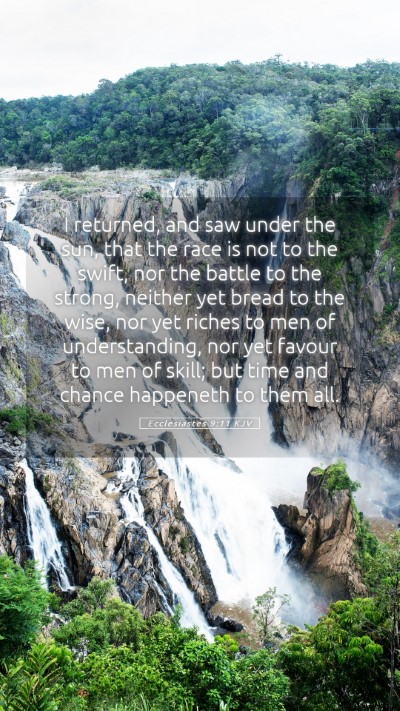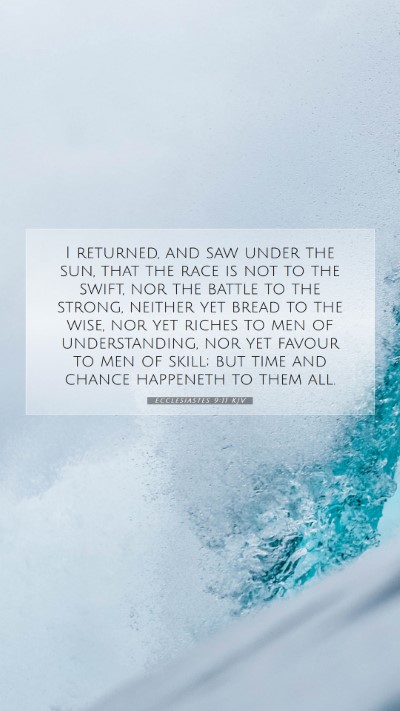Understanding Ecclesiastes 9:11 - A Combined Commentary
Ecclesiastes 9:11 states: "I returned, and saw under the sun, that the race is not to the swift, nor the battle to the strong, neither yet bread to the wise, nor yet riches to men of understanding, nor yet favor to men of skill; but time and chance happeneth to them all."
This verse encapsulates a profound truth about the unpredictability of life and the sovereign will of God.
Drawing from the insights of notable public domain commentaries, we will explore the meaning of this verse, providing valuable Bible verse interpretations and Bible verse explanations.
Context and Introduction
The book of Ecclesiastes, traditionally attributed to King Solomon, reflects on the meaning of life and the pursuit of happiness in a fleeting world. This particular verse highlights the theme of human effort versus divine outcome.
Detailed Analysis
Life's Unpredictability
According to Matthew Henry, this verse reminds us that despite human efforts—whether in speed, strength, wisdom, or skill—the outcomes of life are not guaranteed. The phrase, "time and chance happeneth to them all," emphasizes that randomness and divine timing often play crucial roles in our lives.
The Limits of Human Ability
Albert Barnes suggests that the pursuits of life, such as winning races or battles, do not always lead to expected results. He posits that abilities alone do not determine success; rather, external forces—often beyond human control—can significantly affect outcomes.
Divine Sovereignty
Adam Clarke highlights the significance of acknowledging God's sovereignty. The verse illustrates that human efforts should be complemented with the recognition that God ultimately governs the events of our lives. This echoes the biblical principle found in Proverbs 16:9, "A man's heart deviseth his way: but the Lord directeth his steps."
Theological Implications
This verse challenges the common understanding of rewards in life. It encapsulates the essence of Biblical exegesis by affirming that human logic does not always align with divine wisdom.
According to Matthew Henry, this should inspire humility and reliance on God, acknowledging that our plans may not always align with His providence.
Application in Daily Life
Drawing insights from this scripture can provide guidance on how to approach life's uncertainties. We may engage these concepts in various Bible study groups and Bible study lessons to foster deeper understanding within communities.
Here are some practical applications:
- Embrace Uncertainty: Understand that not every effort will result in success; this can reduce anxiety about outcomes.
- Focus on Character: While striving for excellence is valuable, prioritize building character over mere achievement.
- Trust in God's Plan: Recognize that God's timing is often different from ours and trust that He has a greater purpose.
Related Scripture References
Ecclesiastes 9:11 can be cross-referenced with several verses that highlight similar themes:
- Proverbs 21:31: "The horse is prepared against the day of battle: but safety is of the Lord."
- James 4:14: "For what is your life? It is even a vapour, that appeareth for a little time, and then vanisheth away."
- Matthew 5:45: "For he maketh his sun to rise on the evil and on the good, and sendeth rain on the just and on the unjust."
- Romans 9:16: "So then it is not of him that willeth, nor of him that runneth, but of God that sheweth mercy."
Conclusion
In conclusion, Ecclesiastes 9:11 offers profound Bible study insights into the nature of life, effort, and divine will.
Through this verse, believers are encouraged to seek a deeper understanding of Scripture that transcends mere knowledge of outcomes and prompts a more intimate relationship with the divine.
By engaging in online Bible study and utilizing Bible study tools, individuals can explore these themes further, enriching their faith and understanding of God's sovereign purposes.


